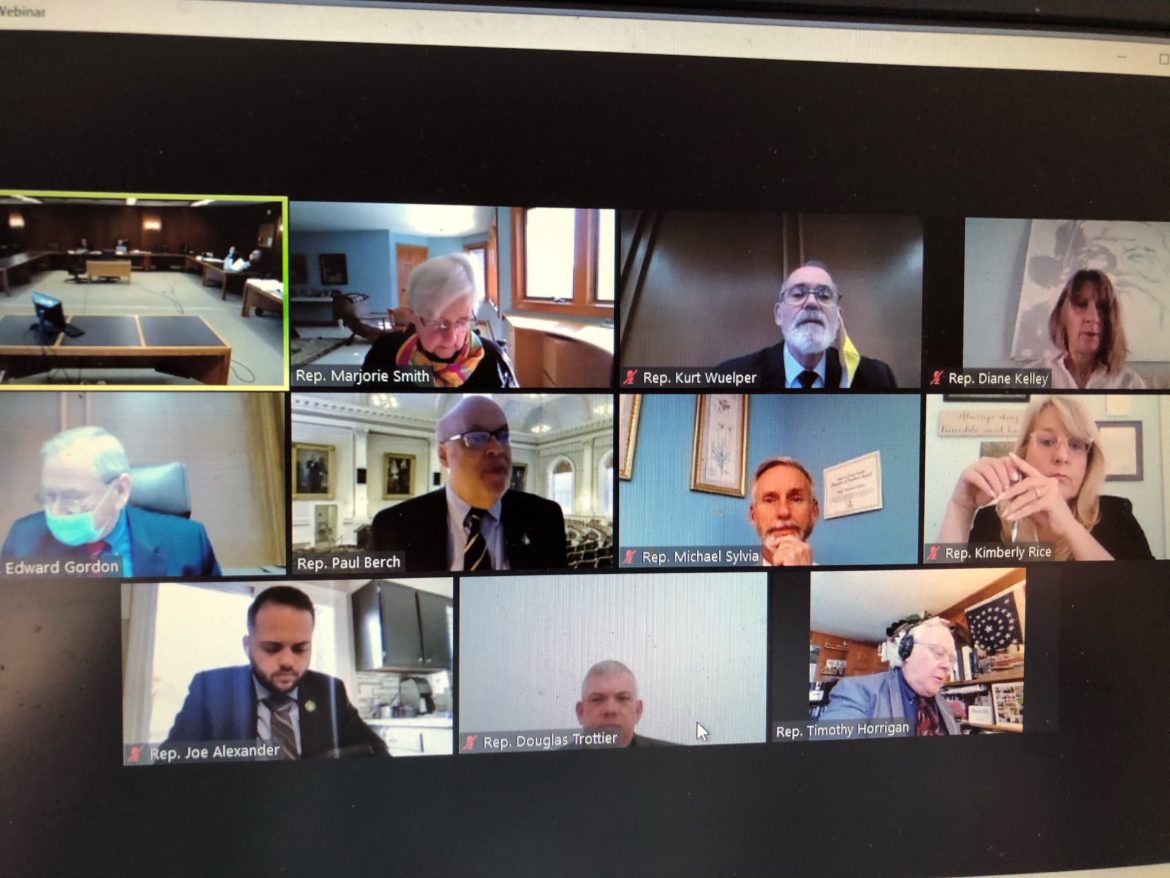By PAULA TRACY, InDepthNH.org
CONCORD – Being able to sit in your kitchen in your pajamas and testify on legislation or just watch it being debated may be a thing of the past after the pandemic in New Hampshire.
A bill that would have made permanent Zoom or remote access to legislative hearings was recommended to be killed by the Republican majority of the House Judiciary Committee Wednesday on an 11-10 vote.
Rep. Marjorie Smith D-Durham, the ranking minority leader on the committee, vowed there would be a minority report and potentially a floor fight on House Bill 216.
Supporters of the bill claim it gives more access and more transparency and is particularly useful to those who cannot easily show up to testify at the Legislative Office Building in Concord for hearings or just want to see what is going on.
It in fact has increased public participation far past what the hearing room could provide, Smith noted.
But opponents said it added much more work to committee secretaries to process the notes from such meetings and it gave a false sense of transparency. One lawmaker claimed some use the mute function to stop listening to views that they don’t agree with, and that they do not focus entirely on the legislation when other things are going on inside their homes.
The bill was among 17 pieces of pending legislation which the committee needed to either recommend, oppose or retain for more consideration Wednesday morning. No testimony was taken from the public during the executive session.
You can watch the meeting here: https://youtu.be/V_fFTORMaL0
Rep. Joe Alexander, R-Goffstown, offered the motion to kill the bill. He said he thought the bill needed more work.
“I don’t think we have, necessarily, a need for it at this time,” Alexander said.
Rep. Alexis Simpson, D-Exeter, spoke against Alexander’s motion and offered an amendment if Alexander’s motion failed, which she said was worked on with the New Hampshire Municipal Association.
Simpson said she had heard from a lot of constituents “who have really appreciated using the remote” function, noting it is a more accessible way for the public to understand bills under consideration.
Chairman Edward Gordon, a Republican from Bristol, said he was not opposed to remote access for the public but was not sure about the point in the bill where members of the legislative committees could decide whether they wanted to meet remotely.
“I think it is this body that should decide,” whether members could participate and vote remotely.
Rep. Michael Sylvia, R-Belmont, said: “I am opposed to these remote meetings in every possible way. It appears to be more transparent but it is less,” Sylvia said, and it is a lot more disorganized.
“A lot of times we don’t know if the legislators are actually listening,” Sylvia said, or “doing other things in our homes…I just think the process is terrible. It’s awkward.”
But Rep. Tim Horrigan, D-Durham, said the Zoom meetings have allowed for more people to hear and be heard.
Smith said she wanted the pandemic to be over so she could interact with her fellow legislators in person. However, it has been clear to her that this has opened up the legislative process.
Smith noted while there were only 42 people in virtual attendance for the session, that is more than could comfortably fit in the committee room.
“We have had hundreds of people watching us,” Smith said.
The remote access works both ways for the public and legislators allowing “an opportunity to grow and learn from…a very painful time.”
Smith called it “unconscionable” behavior to mute someone with an unpopular view and that would be something that could be decided at the voting booth. Involving the community with more access remotely “strongly outweigh the negatives,” Smith said.
She vowed that the bill would have a minority report and that Rep. Simpson would write it.
Rep. Kurt Wuelper, R-Strafford and clerk of the committee, said there is an added burden on record keeping. He said his increased work has forced his wife to buy a dog.
He added there is a lot more concern for security and control of meetings. “I don’t think we are ready to do this on a broad basis,” Wuelper said.





